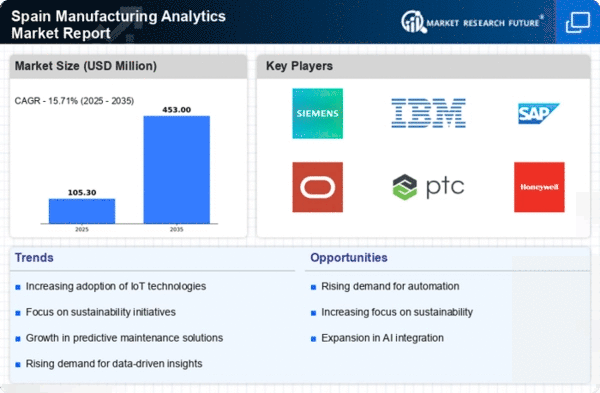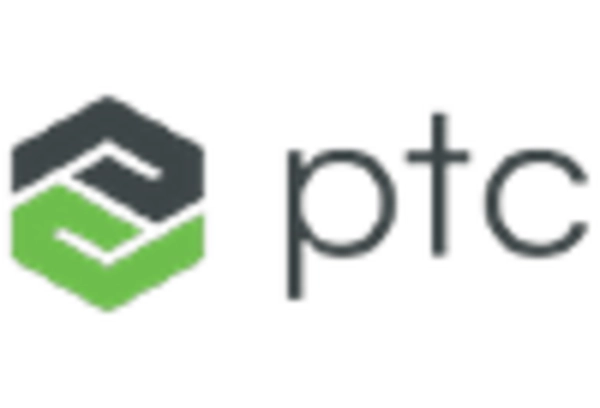Focus on Data-Driven Decision Making
The shift towards data-driven decision making is a pivotal driver for the manufacturing analytics market in Spain. Companies are increasingly recognizing the value of leveraging data to inform strategic decisions, optimize operations, and enhance customer satisfaction. This trend is supported by advancements in analytics technologies that enable real-time data analysis and visualization. As businesses strive to become more agile and responsive to market demands, the adoption of manufacturing analytics tools is expected to rise. Current estimates suggest that organizations utilizing data analytics can improve their decision-making speed by up to 25%. This growing emphasis on data-driven strategies is likely to propel the manufacturing analytics market forward, as firms seek to harness the power of data.
Adoption of Industry 4.0 Technologies
The ongoing transition towards Industry 4.0 is significantly influencing the manufacturing analytics market in Spain. This paradigm shift emphasizes the integration of advanced technologies such as IoT, big data, and automation into manufacturing processes. As companies adopt these technologies, the need for sophisticated analytics solutions becomes paramount. The Spanish government has been supportive of this transition, providing funding and incentives for digital transformation initiatives. It is estimated that by 2025, over 50% of manufacturing firms in Spain will have integrated some form of Industry 4.0 technology, thereby driving the demand for analytics tools that can harness the data generated by these systems. This trend is expected to enhance the capabilities of the manufacturing analytics market.
Rising Demand for Operational Efficiency
The manufacturing analytics market in Spain is experiencing a notable surge in demand for operational efficiency. Companies are increasingly seeking ways to optimize their production processes, reduce waste, and enhance overall productivity. This trend is driven by the need to remain competitive in a rapidly evolving market. According to recent data, organizations that implement analytics solutions can achieve efficiency improvements of up to 20%. As a result, investments in manufacturing analytics tools are expected to grow, with projections indicating a market value increase to €1.5 billion by 2026. This focus on operational efficiency is likely to propel the manufacturing analytics market forward, as businesses recognize the value of data-driven decision-making.
Regulatory Compliance and Quality Control
In Spain, the manufacturing analytics market is increasingly shaped by stringent regulatory compliance requirements and the need for quality control. Industries such as pharmaceuticals and food production are particularly affected, as they must adhere to rigorous standards to ensure product safety and quality. Analytics solutions play a crucial role in monitoring compliance and identifying potential issues before they escalate. The market for manufacturing analytics is projected to grow as companies invest in tools that facilitate real-time monitoring and reporting. Recent estimates suggest that compliance-related analytics could reduce non-compliance incidents by up to 30%, thereby enhancing the overall reliability of manufacturing processes. This focus on regulatory adherence is likely to drive further growth in the manufacturing analytics market.
Investment in Workforce Training and Development
The manufacturing analytics market in Spain is also being influenced by increased investment in workforce training and development. As analytics tools become more sophisticated, there is a growing recognition of the need for skilled personnel who can effectively utilize these technologies. Companies are investing in training programs to equip their workforce with the necessary skills to analyze data and derive actionable insights. This trend is expected to enhance the overall effectiveness of manufacturing analytics solutions. Reports indicate that organizations that prioritize employee training can see productivity gains of up to 15%. Consequently, the emphasis on workforce development is likely to contribute positively to the growth of the manufacturing analytics market.
















